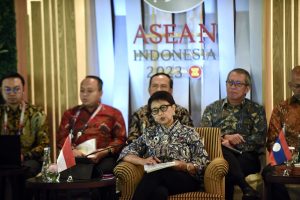Indonesia’s government says that it has hosted a meeting of some of the “major stakeholders” in Myanmar’s civil war, at which each gave a “positive indication” about holding an inclusive dialogue soon.
In a statement Friday, the Ministry of Foreign Affairs said that the November 20-22 meetings in Jakarta were attended by “multi-stakeholders representing the Spring Revolution,” including representatives of ethnic resistance forces and the opposition National Unity Government (NUG). The military administration was represented by “interlocutors,” the statement said, though it did not elaborate on their identity.
The aim of the meeting, which involved parallel meetings, was to “push forward the implementation” of the Association of Southeast Asian Nations (ASEAN)’s Five-Point Consensus peace plan, which calls for “the convening of inclusive dialogues for a comprehensive and durable political solution to the crisis in Myanmar.”
The meetings were also attended by a representative of the government of Laos, which will chair ASEAN next year.
According to the Ministry, the Office of the Special Envoy “also facilitated the exchanges of ‘messages’ from each group that were expected to pave the way for a possible preliminary dialogue, leading towards inclusive national dialogues in order to find a durable and comprehensive solution to the crisis.”
The announcement comes after a month in which resistance forces have made considerable battlefield gains across the country. The gains have been particularly dramatic in northern Shan State, where Operation 1027, a broad offensive by the Three Brotherhood Alliance of ethnic resistance groups, has seized more than 100 military outposts, key border crossings with China, and is poised to seize Laukkai, the capital of the Kokang Self-Administered Zone. With the military overstretched by the burdens of a multi-front war, some have suggested that its collapse is only a matter of time.
During its chairmanship of ASEAN this year, Indonesia has expended considerable effort on bringing the warring factions to the table and pushing forward the Five-Point Consensus, which calls for an immediate cessation of violence, and inclusive dialogue involving “all parties” to the conflict. In its statement, the Foreign Ministry claimed that it has conducted more than 180 engagements with Myanmar multi-stakeholders, including the military junta.
At the same time, little concrete progress has been made. Despite last week’s meetings, serious negotiations remain a remote prospect and talks remain far behind even the “informal meetings,” also hosted by Indonesia, that helped break the deadlock in the Cambodian peace process in the late 1980s.
While recent battlefield reverses pose a serious challenge to military rule, there are no indications that is willing to make serious concessions to the NUG, ethnic armed groups, and their allies, which it views as terrorists bent on splitting the nation.
It may also feel confident that it can weather the current challenges. As Richard Horsey of the International Crisis Group noted earlier this month, the Myanmar military “has been continuously battling various insurgencies since World War II, sometimes against worse odds. Its staying power should not be underestimated. Nor should the regime’s resolve to fight on at all costs.”
Similarly, the NUG and other resistance forces are unlikely to consider negotiations at the very moment that they are making the most significant gains since the 2021 coup. The NUG was quick to emphasize that it did not sit down with the junta, saying in a statement that it only attended the meetings to “provide timely updates on the development of the Spring Revolution,” and that “the possibility of a dialogue solely reflects the view of the Office of the Special Envoy.”
“There has been no engagement whatsoever with any individual, including so-called representatives of the illegitimate military junta,” the NUG added, “neither at any place nor at any point in time.”
The Indonesian-brokered talks probably represent about as much as Jakarta could have reasonably expected to achieve within the constraints of the Five-Point Consensus, and given the tortured political realities in Myanmar. As has been the case since shortly after the coup, the outcome of ASEAN-led initiatives will sit downstream of what happens on the battlefield – and by all appearances, there is a lot yet to play out.

































